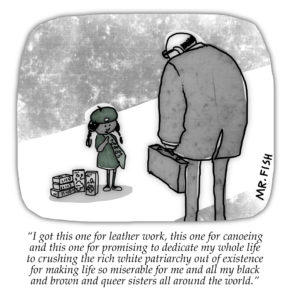Equality, by the Numbers
Let me begin by raising a glass of champagne to the official closing of the math gap. It turns out that girls do not lack the math gene. Nor are they math-phobic. Nor is there any "intrinsic" difference -- thank you, Larry Summers -- between the abilities of girls and boys to succeed in the numbers business.Let me begin by raising a glass of champagne to the official closing of the math gap. It turns out that girls do not lack the math gene. Nor are they math-phobic. Nor is there any “intrinsic” difference — thank you, Larry Summers — between the abilities of girls and boys to succeed in the numbers business. There’s no reason at all for inequality. In fact, there’s no longer inequality.
A new study of the math scores of 7 million students in 10 states shows that girls are now on a par with boys. How many years has it been since protesters stuck a sock in Barbie’s mouth for complaining that “math class is tough”? Girls have gotten to parity the new-fashioned way. By taking more math classes.
This comes just in time for our young math whizzes to figure out a harder puzzle. There is another gender gap closing, this time in the workplace. After decades spent pursuing equality in wages and work, women have finally achieved it — ta da — in job loss.
A report shepherded through Congress by Rep. Carolyn Maloney shows that since the 2001 recession, women have lost jobs and withdrawn from the workplace at the same rate as men. More to the point, they’ve remained out for the same reasons as men: layoffs, downsizing, outsourcing and wage stagnation.
Needless to say, this is not the sort of equality we were looking for. But if there is any good news, it’s that this report may finally, permanently, firmly debunk the idea that droves of women are “opting out” of the workplace for a very different reason: full-time motherhood.
The “opt-out revolution” has been one of the most tenacious story lines of the new century. It arrived full-born with the famous or infamous New York Times Magazine article of 2003 declaring: “Why don’t women run the world? Maybe it’s because they don’t want to.” The idea was that the best and brightest daughters of the women’s movement were choosing home and hearth over “having it all.”
Since then, economists ran the numbers that ran down the myth. There’s no actual proof that motherhood causes women to drop out. On the contrary. Sociologists went to talk with opt-outers, who gave a far more complex picture of the day that work push came to child pull. But the little engine of the story kept chugging along on lifestyle pages and in conservative think tanks.
Mathematically speaking, it divided women, especially mothers, and turned the sisterhood into a firing squad.
This narrative didn’t just survive because it fit traditional views about a woman’s “real” place. It reflected the inner struggle of many mothers trying to balance work and home, boss and child, in the 24/7 work world. It even credited the second shift of caregiving as valuable work.
In hard times too it was easier to tell yourself and others that you’d opted out than been pushed out. It framed the whole debate in the language of choice, suggesting that women have a buffet of lifestyle tidbits for our delight — work, home, both — rather than a series of hard decisions.
The downside, the subtraction lesson, if you will, is that the “choice” frame makes it far too easy to reduce the problems of work and family to the lowest common denominator of one: one woman, one family, one personal decision. “If it’s true that women don’t want to work,” says one economist, “think of all the problems that disappear overnight. We don’t have to think about family leave or after-school or the day-to-day grind or the tough challenges of work and family.”
Now along comes the congressional report on the equality we didn’t want. “When we saw women starting to drop out in the early part of this decade, we thought it was the motherhood movement, women staying home to raise their kids,” said congressional economist Heather Boushey. “We did not think it was the economy, but when we looked into it, we realized that it was.” That’s what math does to you.
We are getting a fuller picture of the real troubles women and families face these days in what we aren’t supposed to call a recession. When men are downsized, outsourced and discouraged, we say they’re unemployed. But when women get pushed out of the economy, we like to say they “opted out.”
But now we know that women too have the math gene. And this just doesn’t add up.
Ellen Goodman’s e-mail address is ellengoodman(at)globe.com.
© 2008, Washington Post Writers Group
Your support matters…Independent journalism is under threat and overshadowed by heavily funded mainstream media.
You can help level the playing field. Become a member.
Your tax-deductible contribution keeps us digging beneath the headlines to give you thought-provoking, investigative reporting and analysis that unearths what's really happening- without compromise.
Give today to support our courageous, independent journalists.






You need to be a supporter to comment.
There are currently no responses to this article.
Be the first to respond.